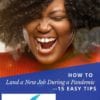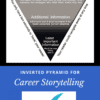
In the Total Resumes 2-part Career Brand Series, I talk about managing your career brand. It’s about telling the story of you.
Why a Personal Brand is Important
You must find a way to stand out. If you stand for everything, you don’t stand for anything. The same is true when establishing your personal brand.
When you create your personal brand, it becomes a shorthand for you. Your personal brand is not your résumé or your bio or your LinkedIn profile. It’s the essence of who you are. And it must be authentic to you.
You know how important Search Engine Optimisation is for when you want to find something online. The keywords you type into Google help you find what you’re looking for, right? The same is true with your personal brand — when you want someone to find you, you want to make sure you’re easy to find. So it’s important to shape your personal brand. You can decide what you want to be known for.
Your personal brand is how you stand out online.
“Branding” is defined as “to make an indelible mark or impression on somebody or something.” It’s a valuable strategy because you are positioning yourself to be successful in your job search and career.
However you describe it, the good news is: You already have a brand — even if you don’t know what it is. You may have already positioned yourself — you may just not have articulated it yet.
Reflection time: Your career success can hinge on whether you have an “accidental brand” or an “intentional brand.” An accidental brand (or reputation) could mean that when it’s time to select someone to move up the corporate ladder, decision-makers don’t even know who you are because your work efforts, results, contributions and personality don’t even register. Effectively, they’re invisible!
Or, an accidental brand is when your name comes up, the characterisation of you is not favourable. For example, someone says, “He’s always missing deadlines.” “She’s hard to get along with.” “She complains a lot.” “He never takes responsibility, he has an excuse for everything.”
An intentional brand is when you’re clear about what you want to be known for and you’ve taken personal responsibility for delivering on that so it’s how you’re perceived.
If you want promotions, project leads or pay raises, it’s crucial to have an intentional brand that positions you for leadership roles.
Who or what are you known as? Maybe you’re known as the PR person who can turn a crisis into a non-issue. Or the graphic designer who specialises in creating attention-getting, award-winning logos. That’s your personal brand. It’s what you’re known for. It’s not just your job title, although that can be part of it.
To have a strong brand, you must be clear about who you are and who you are not.
A successful personal brand is authentic. It reflects your unique personal attributes or qualities.
To cultivate the brand that will help you reach your goals, you must understand and be able to communicate what makes you exceptional and compelling.
The most difficult part of crafting your online profile is sounding original. Be specific about what distinguishes you from other people with your same job title.
How to Identify (and/or Shape) Your Personal Brand
Who are you? What makes you different? How can you figure out what your brand is? The process begins with self-assessment.
Let’s start with a brainstorming exercise. Make a list of words and phrases — things you’ve worked with. Things you’ve accomplished. Specific training you have. What projects have you worked on? Life experience that you’ve had that would be valuable. Write down whatever comes to mind.
Consider these factors:
- Where you grew up
- Where you went to school
- Places you’ve lived
- Special talents/unusual skills
- Past misfortunes/things you’ve overcome
- Languages you speak fluently
- Special training
- Past careers
- Unique life experiences
Also, leverage the things that you enjoy and do well. Focusing on these areas enables you to get the most out of your career while differentiating you from others with the same job description.
Look at your performance reviews. What do other people say about you?
If you’d like a list of questions to answer that can help you, please reach out. You’re not going to be able to answer them now, but I encourage you to take the time to go through them later.
Identify your unique identity. What do you want to be known for? You need to express: “I am this.” Take some time to think through this. It usually takes me a couple of hours to distill my client’s essence. Give it time.
Your personal brand is not your job title. Also, if your personal branding statement could be said about almost anyone with your same job title, it needs work. You are not your job title.
The second piece of the puzzle is that it’s not enough to decide only what you want to be known for. Your personal brand must also align with something that prospective employers value. So the next question is: What do they want?
What problem is the company trying to solve? Solving the problem can be about saving time or building customer relationships. Position yourself to solve a problem.
The question you want to answer for the employer is, “Why should you hire me?” When employers are hiring, they really want to know: “Why should I choose you instead of someone else?” Your personal brand is an important part of answering this question.
Employers hire for their reasons, not yours. There are 12 things employers generally hire employees to do. A colleague, Susan Whitcomb, identified these 12 “Employer Buying Motivators” in her book, Résumé Magic. These are 12 specific needs a company has. These include a company’s need to:
- Make money.
- Save money.
- Save time.
- Make work easier.
- Solve a specific problem.
- Be more competitive.
- Build relationship / an image.
- Expand business.
- Attract new customers.
- Retain existing customers.
See part 2 for How Having a Personal Brand Can Help You Advance In Your Current Job (Or Find a New One)

